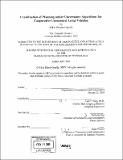Examination of planning under uncertainty algorithms for cooperative unmanned aerial vehicles
Author(s)
Gandhi, Rikin Bharat, 1981-
DownloadFull printable version (11.97Mb)
Other Contributors
Massachusetts Institute of Technology. Dept. of Aeronautics and Astronautics.
Advisor
Lee C. Yang.
Terms of use
Metadata
Show full item recordAbstract
(cont.) of UAVs and targets. Additionally, sensitivity trials are used to capture each algorithm's robustness to real world planning environments where planners must negotiate incomplete or inaccurate system models. The mission performances of both methods degrade as the quality of their system models worsen Cooperation is essential for numerous tasks. Cooperative planning seeks actions to achieve a team's common set of objectives by balancing both the benefits and the costs of execution. Uncertainty in action outcomes and external threats complicates this task. Planning algorithms can be generally classified into two categories: exact and heuristic. In this thesis, an exact planner, based on Markov decision processes, and a heuristic, receding horizon controller are evaluated in typical planning problems. The exact planner searches for an optimal policy with global contingencies, while the heuristic controller sequentially approximates the global plans over local horizons. Generally, the two planners trade mission and computational performance. Although the results are limited to specific problem instances, they provide characterizations of the algorithms' capabilities and limitations. The exact planner's policy provides an optimal course of action for all possible conditions over the mission duration; however, the algorithm consumes substantial computational resources. On the other hand, the heuristic approach does not guarantee optimality, but may form worthy plans without evaluating every contingency. On a fully-observable battlefield, the planners coordinate a team of unmanned aerial vehicles (UAVs) to obtain a maximum reward by destroying targets. Stochastic components, including UAV capability and attrition, represent uncertainty in the simulated missions. For a majority of the examined scenarios, the exact planner exhibits statistically better mission performance at considerably greater computational cost in comparison to the heuristic controller. Scalability studies show that these trends intensify in larger missions that include increasing numbers
Description
Thesis (S.M.)--Massachusetts Institute of Technology, Dept. of Aeronautics and Astronautics, 2005. Includes bibliographical references (p. 121-124).
Date issued
2005Department
Massachusetts Institute of Technology. Department of Aeronautics and AstronauticsPublisher
Massachusetts Institute of Technology
Keywords
Aeronautics and Astronautics.